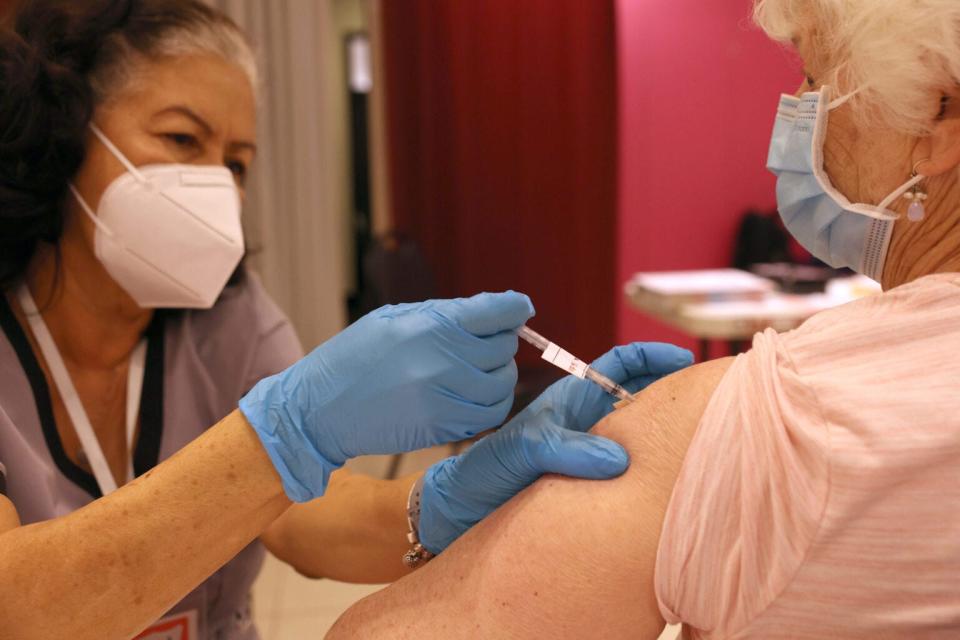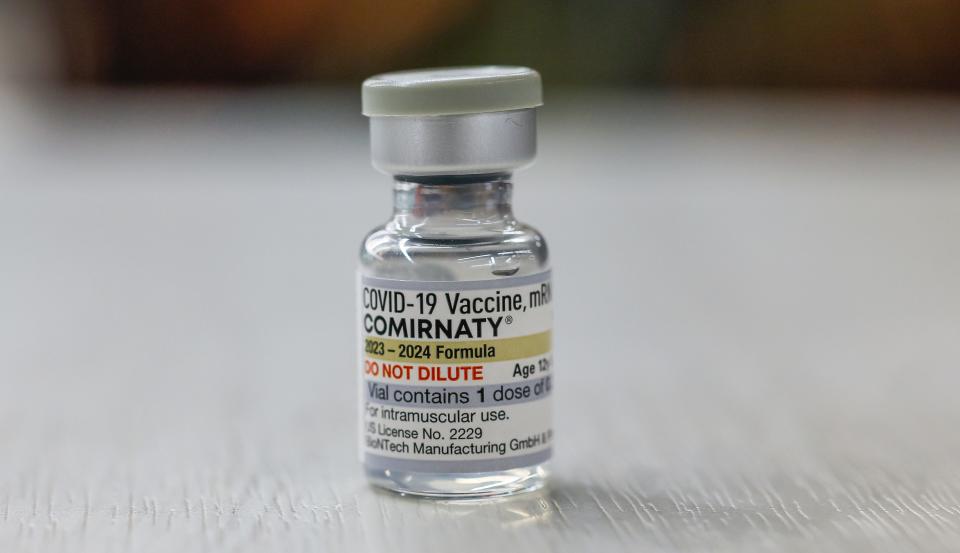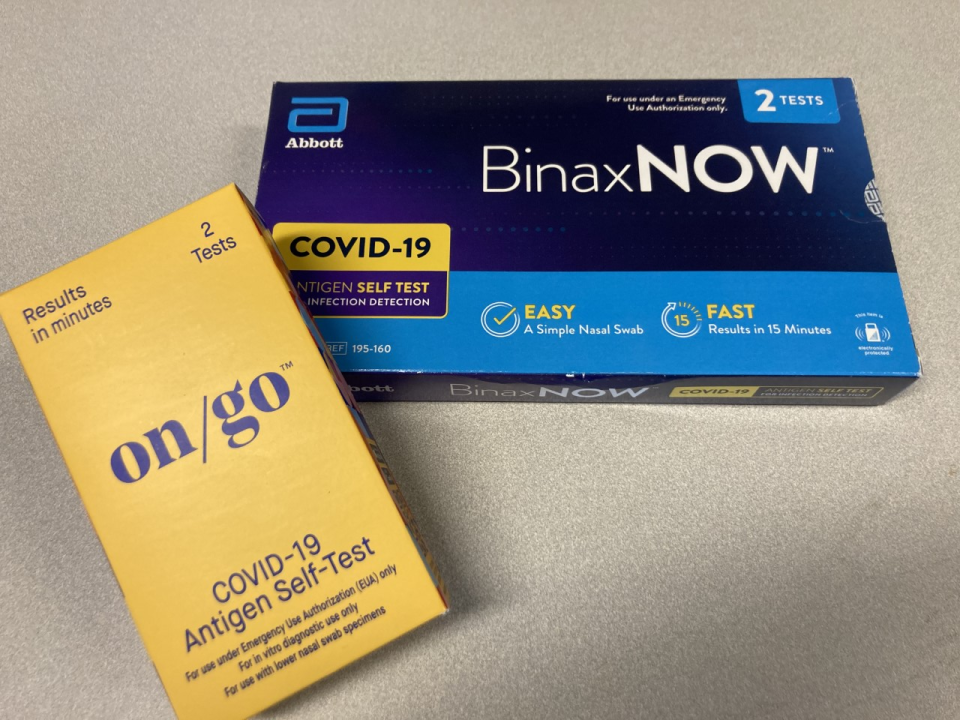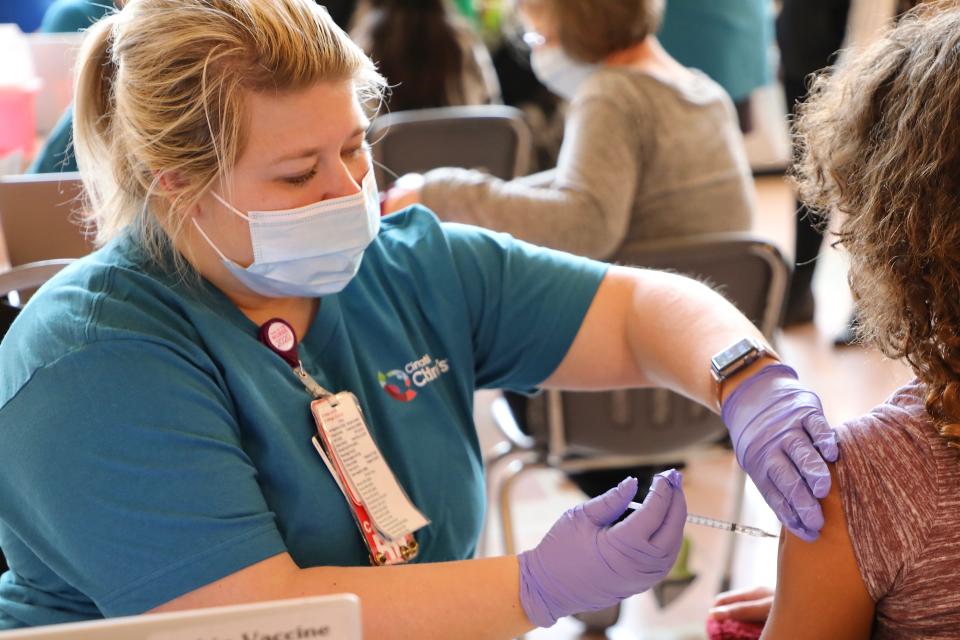COVID-19 cases in Ohio: Who should get the new vaccine? What to know as numbers rise
Reported COVID-19 cases in Ohio have been trending upward since July, and as cooler weather returns, so have some concerns about the virus and other respiratory illnesses.
The Ohio Department of Health reported a two-week statewide average of 129.6 cases per 100,000 residents on Sept. 7. Health officials also identified a new COVID-19 variant in Ohio, and Cincinnati Children’s Hospital Medical Center reinstated a mask mandate for its staff.
This month, the Centers for Disease Control and Prevention also recommended an updated COVID-19 vaccine for fall/winter virus season. Here's what to know about the current state of COVID-19 in Ohio.

Is there a new COVID-19 vaccine?
Yes. New COVID-19 vaccines formulated to target current variants became available this month. The updated mRNA COVID-19 vaccines from Pfizer Inc. and ModernaTX Inc. are meant to protect against variant XBB.1.5, as well as other omicron variants.
"The updated vaccines are expected to provide good protection against COVID-19 from the currently circulating variants,” the U.S. Food and Drug Administration said in a statement. “Barring the emergence of a markedly more virulent variant, the FDA anticipates that the composition of COVID-19 vaccines may need to be updated annually, as is done for the seasonal influenza vaccine."
Novavax’s updated COVID-19 vaccine is still under review by the U.S. FDA for emergency use authorization for individuals aged 12 and older.
Like other COVID-19 vaccines, you can still get the virus after getting the shot. But you’re less likely to be hospitalized or die from COVID-19 if vaccinated.

Who should get the new vaccine?
The U.S. FDA offers this guidance on new COVID-19 vaccines:
Anyone 5 years and older may receive a dose of an updated mRNA COVID-19 vaccine as long as it is at least two months since the last dose of any COVID-19 vaccine.
Infants and toddlers 6 months to 4 years old who've previously been vaccinated against COVID-19 are eligible to receive one or two doses of an updated mRNA COVID-19 vaccine with timing and number depending on the previous vaccine received. Check with your child's pediatrician.
Infants 6 months to 4 years old who are unvaccinated against COVID-19 are eligible to receive three doses of the updated authorized Pfizer-BioNTech COVID-19 vaccine or two doses of the updated authorized Moderna COVID-19 vaccine. Again, check with your child's pediatrician.
If you’ve recently contracted COVID-19, medical professionals recommend waiting 90 days before getting vaccinated.
Check with your doctor or child’s pediatrician for eligibility and timing questions about the vaccine.
If you've already been vaccinated, should you get a booster?
The new COVID-19 vaccines are not considered “boosters.” They are updated formulas that more closely target the XBB lineage of the omicron variant. As of Sept. 12, the CDC recommends the updated Pfizer-BioNTech and Moderna COVID-19 vaccines, which are expected to better fight current variants.
Even if you were previously vaccinated against COVID-19, the CDC says you should still get the new updated vaccine to better protect against current variants. Everyone ages 5 years and older are advised to get one updated COVID-19 vaccine at least two months after getting the last dose of any COVID-19 vaccine, the CDC says.
Where are COVID-19 vaccines near me?
Head to vaccines.gov to find a location near you to get vaccinated against COVID-19.

How to get free COVID-19 testing kits mailed to you
On Wednesday, officials said they were restarting a program that provides free COVID-19 test kits to U.S. households. Tests will be available via covid.gov/tests starting Monday, Sept. 25.
Do COVID-19 tests expire?
Yes, COVID-19 tests do expire. However, CBS News reports some COVID-19 test kits past their expiration dates may still be effective.
The FDA has extended the expiration dates for various test brands, lengthening their shelf lives to up to two years. Click here for a list of authorized over-the-counter COVID-19 diagnostic tests and their expiration date information.
If a test has expired, the FDA states the results could be inaccurate or invalid.
According to the Ohio Department of Health, it is important to observe expiration dates and to remove kits from distribution inventory when appropriate.

Is there a COVID-19 mask mandate in Ohio?
While some states have recently implemented mask requirements, most Ohio schools, hospitals and businesses have not. Earlier this month, Sen. J.D. Vance said Ohio is unlikely to reinstate the rules that were in place at the peak of the COVID-19 pandemic.
However, Cincinnati Children's Hospital Medical Center announced Wednesday that it will require masks for staff in clinical and public areas starting Monday, Sept. 25, because of the spread of respiratory illnesses, including RSV, flu and COVID-19.
Hospital officials strongly recommend patients, families and visitors to Cincinnati Children's wear masks, but they aren't required at this point. That might change should local and national data show an even greater rise in respiratory illnesses in our area.
"This decision was made to promote the safety of our patients, families, visitors, and employees, based on evidence that masks are effective in reducing the spread of respiratory illness," the hospital said in a statement.

What to know about the new COVID-19 BA.2.86 variant
A new COVID-19 variant, BA.2.86, nicknamed pirola, was added to the CDC watch list last month. Since then, one case of the new variant has been confirmed in Lorain County, according to the Ohio Department of Health.
The variant may be more capable of causing infection in people who have previously had COVID-19 or who have received COVID-19 vaccines, per the CDC. Health officials have said the pirola variant has mutations distinct from other variants currently circulating and could be more immune-evasive or more likely to subvert immunities built up by your body.
Some symptoms may include:
A sore throat that causes dryness, itching and throat pain.
Low-grade fever.
Runny nose.
Sneezing.
Mild to moderate fatigue.
Headache.
Ohio COVID-19 dashboard numbers
Reported COVID-19 cases have been steadily rising in Ohio since July. The state reported 34.7 cases per 100,000 residents in the previous two weeks on Aug. 3. That number was 136.6 per 100,000 residents on Thursday.
The same trend was observed in southwest Ohio counties:
Hamilton: from 40.5 on Aug. 3 to 140.1 on Sept. 21.
Butler: from 38.6 on Aug. 3 to 169.1 on Sept. 21.
Warren: from 53.7 on Aug. 3 to 144.5 on Sept. 21.
Clermont: from 42.6 on Aug. 3 to 140 on Sept. 21.
Case rates can't easily be compared to past years or COVID-19 waves because testing isn't as widespread, but hospitals still test patients. There were 455 COVID-19-positive patients being treated in hospitals statewide Thursday, according to the Ohio Department of Health. At this time in 2021, about 3,700 people with COVID-19 were hospitalized statewide.

Gov. Mike DeWine tested positive for COVID-19
Ohio Gov. Mike DeWine tested positive for COVID-19 this week. His office said Tuesday the 76-year-old governor experienced mild cold symptoms, including a 101-degree fever. His office said he is recovering at home.
This article originally appeared on Cincinnati Enquirer: COVID in Ohio: How do I get free tests mailed to me?

